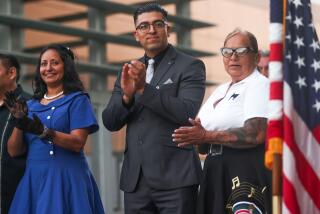Op-Ed: Friends, donors and countrymen

- Share via
Political news gathering these days often consists of warnings about “donor fatigue,” followed by excited updates on the dollar figure each candidate and party has collected. Given the complaints and overheated debates about all this, why don’t we take the next logical step? Let’s skip elections entirely and simply sell the offices to the candidates who offer the most cash. (Some cynics might say we already do that.) We could then easily fund Social Security and other programs and avoid those annoying robocalls, beseeching emails and ubiquitous television ads.
There’s a clear precedent to follow: In Rome in AD 193, two politicos went monetarily mano a mano. Their goal? To win the top-toga position in the Roman Empire, that of emperor.
The rivals apparently skipped those dismal debates and went straight to the bidding war. To distinguish themselves from other toga-wearing males, candidates wore special togas whose wool fabric had been whitened with sulfur. They were called candidus (Latin for “bright shining white”), which later led to our words “candidate” and “candid.”
One of the imperial hopefuls, a city administrator named Titus Flavius Sulpicianus, made a strong showing because he was the father-in-law of the recently assassinated emperor, Pertinax. His opponent, a chirpy 60-year-old senator of substantial means called Marcus Didius Julianus, boasted equally impressive nepotism and career credentials.
Instead of being run by the Roman Senate or the people, this “pay us to play” electoral process was handled by the Praetorian Guard, a once-elite special military force that had awakened to the beauty of selling the imperial seat rather than guarding it.
There was no attempt to make stealthy deals behind closed doors. At the Praetorian camp, bids and counter-bids shouted out by Sulpicianus and Julianus flew through the air, while guards helpfully repeated the figures offered by each candidate. The victor? Julianus, who won the emperor auction for 175 million sesterces, which slid immediately into the grubby hands of the Praetorian Guard.
Once in office, the new Roman emperor issued his first order, devaluing the currency. To no one’s surprise, he failed to win over either aristocrats or plebs. Julianus proudly held office for a full 66 days before being executed and replaced by Septimius Severus, a general astute enough to get himself proclaimed Caesar without a bidding war. He was also smart enough to promptly disband the Praetorian Guard and install his bodyguards handpicked from his legion of supporters.
If the idea of high offices for sale on EBay is too unseemly, another ancient precedent could offer our political candidates a higher-minded challenge.
Beginning in 5th century BC Athens, the city’s wealthiest citizens were tapped for the obligatory honor of financing big civic projects. These prestigious philanthropic assignments, called liturgies (original meaning: “work for the people”) included such undertakings as building a new aqueduct and paying the annual cost of maintaining one trireme ship in the Athenian navy.
The budgets of drama and music festivals alone required 100 well-heeled underwriters each year.
In Rome and throughout the early Roman Empire, liturgies also became a tombstone-worthy boast. Women of means often took part; their names and philanthropic deeds, in Latin or Greek, still adorn ancient monuments around the Mediterranean. Female benefactors and well-known figures such as Pliny the Younger also funded modern-sounding social programs, such as food and educational subsidies for low-income children.
Liturgies would work beautifully today. Instead of panhandling citizens and special-interest groups for donations, political candidates could spend some of their wealth to fix bridges, build schools and support the arts.
Let the men and women who want to be servants of the people earn back our trust the old-fashioned way and show their commitment by carrying out voter-specified works in the public interest. Instead of liturgy, we could call it an investment in the greater good. That puts a satisfying new spin on the term “buying American,” doesn’t it?
Vicki León wrote about liturgists and ancient political skulduggery in “Working IX to V,” the first in her trilogy of books on the ancient world.
Follow the Opinion section on Twitter @latimesopinion
More to Read
A cure for the common opinion
Get thought-provoking perspectives with our weekly newsletter.
You may occasionally receive promotional content from the Los Angeles Times.









